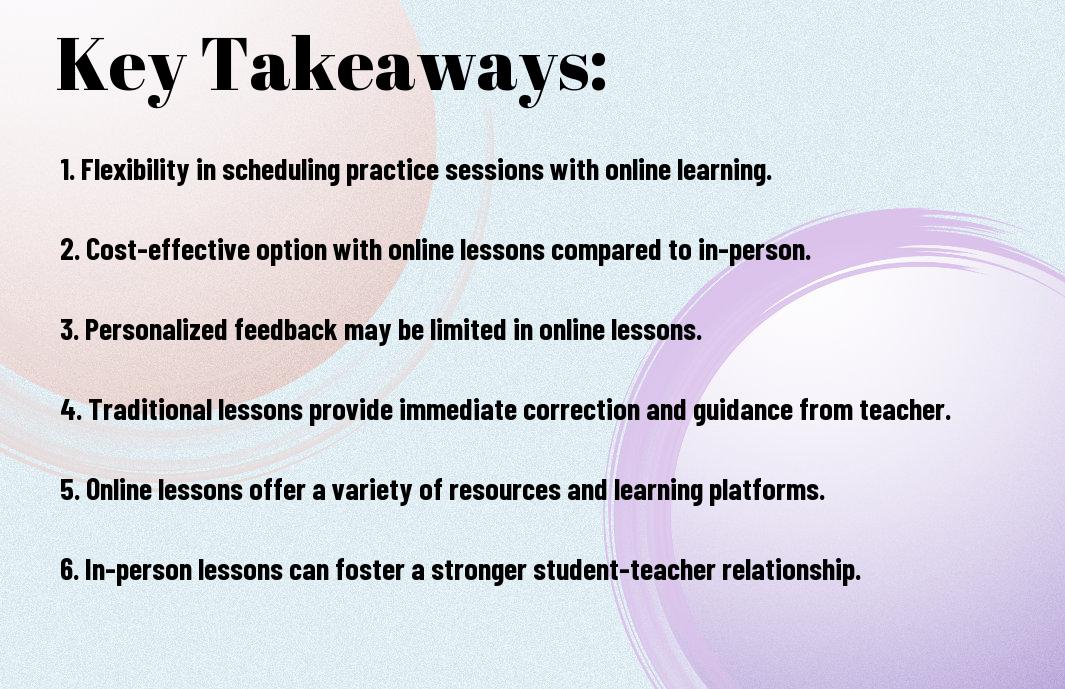Many aspiring musicians like yourself often wonder how learning piano online stacks up against the traditional in-person lessons. In this informative comparison, we will investigate into the pros and cons of each method, helping you make an informed decision on which avenue best suits your musical journey. Whether you prefer the convenience of online lessons or the personal touch of face-to-face instruction, we’ll explore the unique benefits and drawbacks of both approaches. So, let’s dive in and discover which option harmonizes best with your learning style and goals.
Key Takeaways:
- Convenience: Online piano lessons offer the flexibility to schedule sessions at your own convenient time, avoiding the need for travel.
- Personalized Learning: In-person lessons provide immediate feedback and correction from the instructor, while online lessons may require self-motivation and discipline for improvement.
- Cost-effectiveness: Learning piano online can be more cost-effective compared to traditional lessons, as it eliminates the need for commuting expenses and potentially offers more affordable options.
The Rise of Online Learning
The Digital Age and Music Education
With the exponential growth of technology, the landscape of education has been revolutionized. This shift towards digital platforms has not skipped music education. Online piano lessons have surged in popularity, offering a new way for aspiring musicians like you to learn and improve your skills.
Accessibility and Convenience of Online Lessons
Education is no longer confined to traditional classrooms or studios. Online piano lessons provide you with the flexibility to learn from the comfort of your own home, at your own pace. You no longer need to schedule your day around fixed lesson times; instead, you can choose a time that fits your schedule best.
It’s a game-changer for those with busy lifestyles or limited access to in-person instructors. With online piano lessons, you have the freedom to learn whenever and wherever you want, making it easier to incorporate music into your daily routine.
Traditional In-Person Lessons
The Timeless Appeal of Face-to-Face Instruction
Instruction in a traditional, in-person setting offers a unique learning experience that cannot be replicated entirely by online platforms. The direct guidance from a skilled piano teacher, sitting beside you, observing your hand positioning, posture, and technique, is invaluable. According to Piano Software and Apps vs. In Person Lessons – VoicesInc.org, this personalized approach allows for immediate feedback and correction, ensuring that bad habits are nipped in the bud before they become ingrained in your playing.
The Benefits of Human Interaction and Feedback
One of the primary advantages of in-person piano lessons is the real-time interaction and personalized feedback that you receive from your instructor. You can ask questions, seek clarification, and engage in a musical dialogue that enhances your understanding of the instrument and music theory. The emotional connection and rapport built through face-to-face lessons can motivate you to practice diligently and strive for improvement.
Interaction with a teacher who understands your learning style, challenges, and aspirations can lead to customized lesson plans tailored to your needs. Moreover, having a human presence to guide you through moments of frustration or self-doubt can be incredibly reassuring and inspiring. This personalized touch fosters a supportive environment where your musical journey is nurtured and celebrated.
Comparing the Learning Experience
Any online learning experience differs from traditional in-person lessons in various ways. Let’s break down the comparison into key aspects:
| Structured Learning | Self-Directed Learning |
| Online piano lessons often offer structured curriculums and progress tracking tools to guide your learning journey systematically. | On the other hand, in-person lessons may allow more room for self-directed exploration and improvisation, depending on your preferences and the teacher’s style. |
The Role of Technology in Enhancing Engagement
Enhancing engagement through technology is a major advantage of online piano lessons. Interactive apps, virtual keyboards, and instant feedback mechanisms can make the learning process more dynamic and enjoyable.
Learning becomes more interactive and engaging through the use of various technological tools. For example, virtual keyboards can help you practice and receive feedback in real-time, enhancing your understanding and skill development.
Personalization and Adaptability in Online Lessons
Learning piano online allows for a high level of personalization and adaptability. From choosing your preferred learning pace to accessing a wide range of resources tailored to your skill level, online platforms offer flexibility that traditional lessons may lack.
Technology plays a crucial role in enabling personalized learning experiences for piano students. Features such as AI-based recommendations and progress tracking help align the curriculum with your individual learning needs, ensuring efficient progress and skill development.

The Quality of Instruction
Not all piano instruction is created equal. When comparing online piano lessons to traditional, The Pros and Cons of Online Piano Lessons vs In Person …, the quality of instruction is a crucial factor to consider. Let’s research into the qualifications and expertise of online instructors, as well as the importance of pedagogy in traditional lessons.
Qualifications and Expertise of Online Instructors
Quality instruction begins with the qualifications and expertise of the instructors. Online platforms often provide access to a diverse range of instructors from around the world, allowing you to select a teacher whose style and expertise align with your goals. Many online instructors have extensive experience, certifications, and even performance backgrounds that can enhance your learning experience.
The Importance of Pedagogy in Traditional Lessons
The pedagogy employed in traditional piano lessons is a fundamental aspect of the quality of instruction. In-person lessons often focus on not just teaching you how to play the piano, but also on the theory, technique, and musicality behind the notes. The one-on-one interaction with a teacher allows for immediate feedback and personalized instruction tailored to your learning style.
For instance, a traditional piano instructor can correct your hand position, posture, and fingering in real-time, addressing issues as they arise. This personalized attention is invaluable in building a strong foundation and advancing your skills effectively.
Accountability and Feedback Mechanisms
Instructors, both online and in-person, play a vital role in providing accountability and feedback mechanisms to help you progress in your piano journey. Online platforms often have features that track your practice time, offer progress reports, and allow for communication with instructors via messaging or video calls.
Feedback from instructors is crucial for your development as a pianist. In traditional lessons, immediate feedback on your performance, technique, and interpretation can significantly impact your growth. Regular assessments and constructive criticism from an experienced teacher can push you to improve and strive for excellence.

Cost and Value
The Economics of Online Lessons
Now, when it comes to the cost of online piano lessons compared to traditional in-person instruction, there are a few key differences to consider. Any online platform usually offers different pricing plans, allowing you to choose a package that fits your budget and learning needs. You may find that online lessons are more affordable than traditional lessons, as they eliminate travel costs and may offer discounts on bulk lesson packages.
The Investment in Traditional In-Person Instruction
For those who opt for traditional, in-person piano lessons, the investment can vary based on factors such as the teacher’s expertise, location, and lesson duration. A one-on-one lesson with an experienced instructor may come at a higher price point compared to online lessons. Some traditional instructors also require additional fees for materials or recital participation, which can add to the overall cost.
A traditional in-person lesson offers a personalized experience where the teacher can provide immediate feedback and tailor instruction to your learning style. This individualized attention can be invaluable for your progress and motivation. For those who prefer face-to-face interaction and guidance, the investment in traditional lessons can bring a sense of accountability and structure to your learning.
Weighing the Costs and Benefits
Lessons, when considering the costs and benefits of online versus in-person piano instruction, it’s crucial to weigh your priorities. Online lessons may offer flexibility in scheduling and cost-effectiveness, making them suitable for busy individuals or those on a budget. However, traditional lessons provide a unique learning environment with real-time interaction and personalized guidance from a skilled instructor.
For instance, if you value convenience and affordability, online lessons might be the right choice for you. On the other hand, if you prioritize a hands-on approach and in-depth instruction, investing in traditional in-person lessons could be more beneficial for your musical journey.
Overcoming Challenges
Staying Motivated and Disciplined in Online Learning
All journeys have their ups and downs, and learning piano online is no exception. On your online learning path, staying motivated and disciplined is crucial. Without the structure of traditional, in-person lessons, it can be tempting to procrastinate or let your practice sessions slide. To combat this, set specific goals for yourself and create a daily or weekly practice schedule. Treat your online lessons with the same dedication as you would with in-person instruction. Note, progress comes with consistent effort.
Addressing Technical Issues and Connectivity Problems
Problems with technology can be a roadblock in your online piano learning experience. If you encounter technical issues or connectivity problems during your online lessons, don’t get discouraged. It’s vital to troubleshoot common problems like audio lag, internet connectivity issues, or software glitches. Ensure you have a stable internet connection, close unnecessary background applications, and familiarize yourself with the online platform’s settings. Don’t hesitate to seek help from your online instructor or technical support to address any persistent issues.
Another tip to address technical issues and connectivity problems is to have a backup plan in place. Consider keeping a spare set of headphones, an alternative device, or a different internet connection option available as a contingency. Being prepared for potential technological challenges can help you navigate through any disruptions seamlessly and maintain your focus on learning and improving your piano skills.
Building Confidence and Performance Skills
Confidence is key when it comes to showcasing your piano skills, whether in an online setting or in front of an audience. As you progress in your online piano lessons, it’s vital to build your confidence and performance skills. Practice performing pieces regularly, record your performances, and reflect on your progress. Visualize yourself performing with poise and conviction, and embrace opportunities to share your music with others, such as in virtual recitals or online forums.
A positive mindset and a willingness to step out of your comfort zone are vital in building confidence and honing your performance skills. Embrace constructive feedback from your online instructor and peers, and use it as fuel to improve and grow as a pianist. Note, the journey to becoming a skilled pianist is as much about developing your confidence and stage presence as it is about mastering technical skills.

Conclusion
With this in mind, it is clear that learning piano online offers numerous benefits compared to traditional, in-person lessons. Online platforms provide flexibility in scheduling, personalized lesson plans, and the convenience of learning from the comfort of your own home. Additionally, the availability of a wide range of resources, such as video tutorials and interactive practice tools, can enhance your learning experience and help you progress at your own pace.
While traditional lessons may offer the advantage of face-to-face interaction and immediate feedback from a teacher, online lessons have proven to be effective in facilitating learning and accommodating different learning styles. Ultimately, the choice between online and in-person lessons depends on your personal preferences and goals as a piano student. Whether you opt for the structured approach of traditional lessons or the convenience and flexibility of online platforms, the key is to find a method that resonates with you and helps you achieve your musical aspirations.
Q: Is learning piano online as effective as traditional in-person lessons?
A: Online piano lessons can be just as effective as traditional in-person lessons, as long as you have a good internet connection and a quality online instructors. Many online platforms offer interactive lessons, feedback, and personalized instruction to help students progress.
Q: Are there any advantages to learning piano online versus traditional lessons?
A: Yes, there are several advantages to learning piano online. Online lessons offer more flexibility in terms of scheduling, location, and cost. Students can learn at their own pace and access lessons from anywhere with an internet connection. Additionally, online lessons often provide a variety of resources such as video tutorials, practice exercises, and supplemental materials.
Q: What are some potential drawbacks of learning piano online compared to traditional lessons?
A: One potential drawback of learning piano online is the lack of face-to-face interaction with an instructor. In-person lessons allow for immediate feedback and correction, as well as a more personalized learning experience. Additionally, some students may find it challenging to stay motivated and accountable without the structure of in-person lessons. It’s important to consider your learning style and preferences when deciding between online and traditional lessons.


